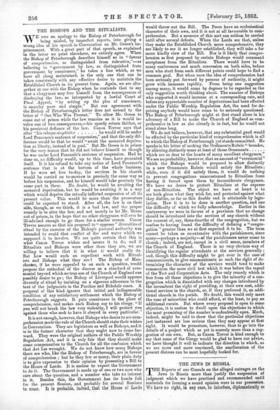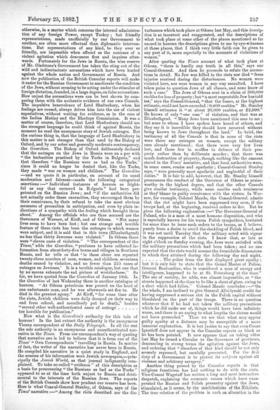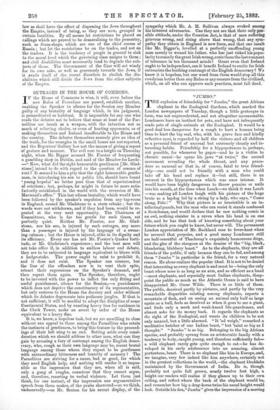THE JEWS IN RUSSIA. T HE Reports of our Consuls on
the alleged outrages on the Jews in Russia more than justify the suspension of judgment which we have practised and recommended until materials for forming a sound opinion were in our possession. We have no right, in any case, to interfere, diplomatically or
otherwise, in a matter which concerns the internal administra- tion of any foreign Power, except Turkey ; but friendly representations, made unofficially by one Government to another, are often more effectual than diplomatic interven- tions. But representations of any kind, be they ever so friendly, are impossible when offered as the outcome of a violent agitation which denounces first and inquires after- wards. Fortunately for the Jews in Russia, the wise reserve of Mr. Gladstone's Government has taken the sting out of the wild and indiscriminate accusations which have been hurled against the whole nation and Government of Russia. And now the publication of the British Consular reports will make it easier for the Russian Government to ameliorate the condition of the Jews, without seeming to be acting under the stimulus of foreign dictation, founded, in a large degree, on false accusations. How unjust the accusations were can be best shown by com- paring them with the authentic evidence of our own Consuls. The impulsive benevolence of Lord Shaftesbury, when his feelings are roused, always drives him into the use of violent superlatives, without waiting for evidence, as in the case of the Indian Mutiny and the Rhodope Commission. It was a matter of course, therefore, that Lord Shaftesbury should use the strongest language he could think of against Russia, the moment he read the anonymous story of Jewish outrages. But the curious thing is, that the language of Lord Shaftesbury in this matter is not stronger than that used by the Bishop of Oxford, and by our sober and generally moderate contemporary, the Guardian. The Bishop of Oxford deliberately declared that the outrages on the Jews in Russia were on a par with " the barbarities practised by the Turks in Bulgaria," and that therefore " the Russians were as bad as the Turks," since it could no longer be denied that, like the Turks, they made "war on women and children." The Guardian —and we quote it in particular, on account of its usual moderation and fairness—made the following categorical assertions :—" Individual instances of horrors as fright- ful as any that occurred in Bulgaria" had been per- petrated on the Russian Jews ; and " if the authorities did not actually order these enormities, they encouraged them by their connivance, by their refusal to take the most obvious measures of precaution in anticipation, and even by plain in- dications of a sympathy with the feeling which brought them about." Among the officials who are thus accused are the Governors of Warsaw, of Kieff, and of Odessa. "Not many lives seem to have been lost ; but one strange and terrible feature of these riots has been the outrages to which women were subject, and it is said that in this town (Elizabethgrad) no less than thirty Jewesses were violated." In Odessa there were " eleven cases of violation." " The correspondent of the Times," adds the Guardian, " professes to have collected in- formation from about forty-five towns and villages in Southern Russia, and he tells us that ' in these alone are reported twenty-three murders of men, women, and children, seventeen deaths caused by violation, and no fewer than 225 cases of outrages on Jewesses.' It is a terrible catalogue, but one that by no means exhausts the sad picture of wretchedness." So far, we have quoted from the Guardian of January 18th. In the Guardian of last Wednesday there is another catalogue of horrors. "At Odessa petroleum was poured on the head of one unfortunate man, and he was afterwards set fire to. He died in the greatest agony." At Kieff, " for some time after the riots, Jewish children were daily decoyed on their way to and from school, and mercilessly put to death," besides "several other well-authenticated cases of outrage too horrible for publication."
Now what is the Guardian's authority for this tale of horrors ? In the last extract the authority is the anonymous Vienna correspondent of the Daily Telegraph. In all the rest the sole authority is an anonymous and unauthenticated nar- rative in the Times. From our correspondent's way of quoting that narrative one is led to believe that it is from one of the Times' " Own Correspondents" travelling in Russia. In matter of fact, the writer of the narrative has never been in Russia.
He compiled his narrative in a quiet study in England, and the sources of his information were Jewish newspapers,—prin- cipally the Jewish World, as that journal indignantly com-
plained. To take so-called " evidence " of this description as
a basis for pronouncing " the Russians as bad as the Turks " appeared to us at the time both unjust to Russia and detri-
mental to the interests of the Russian Jews. The reports of the British Consuls show how prudent our reserve has been. Here is what Consul-General Stanley, of Odessa, says of the Times' narrative :—" Among the riots described. are the dis-
turbances which took place at Odessa last May, and this descrip- tion is so incorrect and exaggerated, and the descriptions of what took place at some other of the places mentioned so far exceed in horrors the descriptions given to me by eye-witnesses at those places, that I think very little faith can be given to any part of it, more especially to the accounts of violations of women."
After quoting the Times account of what took place at Odessa, " there is hardly any truth in all this," says our Consul-General. And then he proceeds to refute the accusa- tions in detail. No Jew was killed in the riots nor died " from injuries received during the disturbances. No women were violated here, nor were women in any way assaulted. I have taken pains to question Jews of all classes, and none know of such a case." The Jews of Odessa sent in a claim of 300,000 roubles for loss of property; but "a most respectable Jew has told me," says the Consul-General, " that the losses, at the highest estimate, could not have exceeded 0,000 roubles." Mr. Stanley himself estimates it " at about 20,000 roubles, or £2,000." He knows of only "one case" of violation, and that was at Elizabethgrad. " Many Jews have mentioned this case to me ; but none to whom I have spoken have heard of others, and they say it is incredible they should have occurred without being known to Jews throughaut the land." In -brief, the testimony of all the Consuls is that in none of the riots were there any outrages on women, except the solitary case already mentioned ; that there were very few lives lost, and those few in scuffles in defence of their pro- perty rather than by deliberate murder ; that there was much destruction of property, though nothing like the amount. stated in the Times' narrative, and that local authorities were, in some cases, remiss and apathetic ; Consul-General Stanley says, " were generally most apathetic and neglectful of their duties." It is fair to add, howevef, that Mr. Stanley himself pronounces the conduct of the Governor of Odessa as praise- worthy in the highest degree, and that the other Consuls give similar testimony, while none ascribe such remissness as they blame to guilty connivance with the rioters. In War- saw, for example, Colonel Maude, the Consul-General, admits that the riot might have been suppressed very soon, if the troops had, at the beginning, received orders to fire. But he gives the following explanation :—" The Governor-General of Poland, who is a man of a most humane disposition, and who is especially known for his warm Polish sympathies, hesitated for some time to issue such orders to the troops, as I believe, purely from a desire to avoid the shedding of Polish blood, and it was not until Tuesday that the military acted with vigour in the suppression of the riots. I know that, as late as eight o'clock on Sunday evening, the Jews were satisfied with the military precautions which had been taken ; and no one expected that the riots would assume the formidable dimensions to which they attained during the following day and night.
The police from the first displayed great apathy ; but it is only fair to state that the Grand Master of Police, General Boutourline, who is considered a man of energy and intelligence, happened to be at St. Petersburg at the time."
The use of cavalry, he adds, was almost impossible, as " the streets happened at the time to be like a sheet of glass, owing to a sleet which had fallen." Colonel Maude concludes :—" On the whole, I am inclined to give General Ajb6Jynski credit for having suppressed a serious riot in the Polish capital without bloodshed on the part of the troops. There is no question whatever that if he had not taken the military precautions which he did make use of, things would have been infinitely worse, and there is no saying to what lengths the rioters would not have proceeded." Thus we see that what may appear guilty apathy at a distance may be susceptible of a more innocent explanation. It is but justice to say that even Count Ignatieff does not appear in the Consular reports as black as he has been painted. It now appears that on taking office last May he issued a Circular to the Governors of provinces, denouncing in strong terms the agitation against the Jews, and ordering that " disorders of that kind should bo not only severely repressed, but carefully prevented. For the first duty of a Government is to protect its subjects against all violence and arbitrary savagery." Another thing proved by the Consular reports is that religious fanaticism has had nothing to do with the riots. Vice-Consul Wagstaff has written a long and most instructive
despatch, explaining the economic causes which have exas- perated the Russian and Polish peasantry against the Jews, stimulated, as it seems, by the machinations of the Nihilists. The true solution of the problem is such an alteration in the law as shall have the effect of dispersing the Jews throughout the Empire, instead of being, as they are now, grouped in certain localities. By all means let restrictions be placed on callings which are proved to be demoralising to the peasantry, such as dram-shops, which are one of the chief curses of Russia • but let the restrictions be on the trades, and not on the traders. It is the tendency of people in general to sink to the moral level which the governing class assigns to them ; and civil disabilities must necessarily tend to degrade the sub- jects of them. The Government of the Czar will act wisely for its own sake, as well as generously towards the Jews, if it avails itself of the recent disorders to abolish the dis- abilities which still divide the Jews from the other subjects of the Empire.




































 Previous page
Previous page